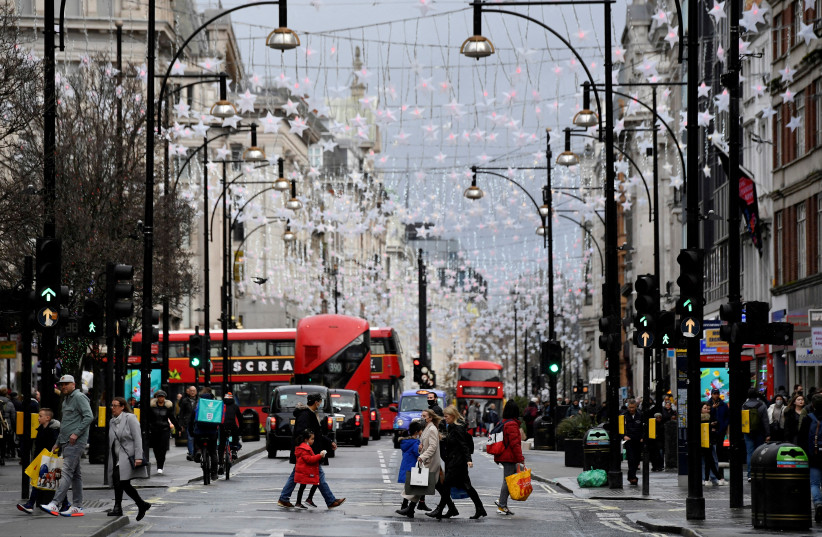Aside from tea-drinking, politeness and emotional repression, British people have two religions. The first is our National Health Service, which is taxpayer-funded, free at the point of delivery and doesn’t work very well. The second is the BBC (which is alarmingly similar).
Both institutions evoke inexplicable loyalty and inexplicable affection among Britons in equal measure. Yet when it comes to our national broadcaster, the Jewish community has long found it particularly difficult.
Over the past two years, the newspaper I edit, The Jewish Chronicle (the oldest Jewish paper in the world), has exposed numerous instances of apparent bias against Jews and Israel in BBC reporting.
The most high-profile of these was an attack on a busload of Jewish youngsters on Oxford Street, in the heart of central London, last Hanukkah.
A video of the incident showed the teenagers barricading themselves on their bus against a gang of men outside who were performing Nazi salutes, spitting and hammering on the windows. They were speaking mainly Hebrew.

But when the BBC reported it, the story alleged that one of the victims had blurted out a racial slur against the attackers while cowering in the bus.
In fact, the BBC didn’t allege it. It reported it as fact, even though the supposed slur was not audible to many people and the victims themselves denied it, saying it was a Hebrew phrase the BBC had misheard.
The corporation refused to back down, causing great hurt to the Jewish community as it responded petulantly to complaints. As a result, the media watchdog, Ofcom, launched an investigation into BBC accuracy (which is yet to be concluded).
Examples of BBC bias against Jews, Israel
This is just the tip of the iceberg. Over the years, the Chronicle has repeatedly reported on how the BBC’s Arabic-language output departs from impartiality guidelines, downplaying attacks on Israelis, using Hamas-inspired terminology (calling terrorists “resistance fighters,” for example), showcasing extreme views without challenge and publishing a map in which Israel was erased.
But the iceberg goes deeper still. The BBC regularly features the Islamist Abdel Bari Atwan as a commentator on its high-profile programs in both Arabic and English.
London-based Atwan has praised terror attacks against Israelis as a “miracle,” has stated that he would dance in Trafalgar Square if Iran attacked Israel, expressed sympathy with the man who attacked novelist Salman Rushdie and – unbelievably – defended the 1972 massacre of the Israeli Olympic team in Munich.
The Chronicle has brought this man’s track record to the attention of the BBC on numerous occasions, but it refuses to remove him from its programs.
Demands and petitions against the BBC
Six weeks ago, we launched an open letter demanding that Atwan no longer appears on the BBC, as well as asking for a more impartial approach toward reporting on Israel and Jews.
The letter was signed by 36 distinguished parliamentarians, public figures and all major Jewish communal groups. Signatories included Lord Michael Howard, the former leader of the Conservative Party; Lord Alex Carlile, the government’s former terror specialist; Baroness Ruth Deech, a former BBC governor; Lord David Triesman, the former Labour minister in charge of the BBC World Service; eminent historians Simon Sebag Montefiore and Andrew Roberts; and playwright Steven Berkoff.
The BBC ignored the letter.
Or at least, it ignored it until last week, when we launched a public petition demanding a parliamentary inquiry into BBC coverage of Jews and Israel. As luck would have it, on the same day as we started the petition, hapless prime minister Liz Truss was forced to resign. The BBC director-general chose that moment to respond, meaning that his letter did not “cut through” the maelstrom of political news in the way it normally would.
Astonishingly, the letter insisted that including Atwan as a commentator was “in the public interest.” It was described as “vacuous” by Baroness Deech, while Liberal Democrat peer Lord Palmer called it “pathetic,” saying: “The BBC seems to feel that it’s OK to give a platform to extremists.”
“The BBC seems to feel that it’s OK to give a platform to extremists.”
Lord Palmer
MP Robert Halfon observed that the letter “appeared to have been written by Sir Humphrey [a fictional comedy civil servant]”, while Lord Carlile said he was “very disappointed by a response that is plainly mostly characterized by obfuscation.”
Readers, we need your help. Our petition has started off nicely, but it needs more support. Please consider signing it so that together we can force our beloved BBC to return to the values on which it was founded: accountability, accuracy and, above all, impartiality.
You can find the petition at thejc.com/BBCPetition. Thank you.
The writer is editor of The Jewish Chronicle.
